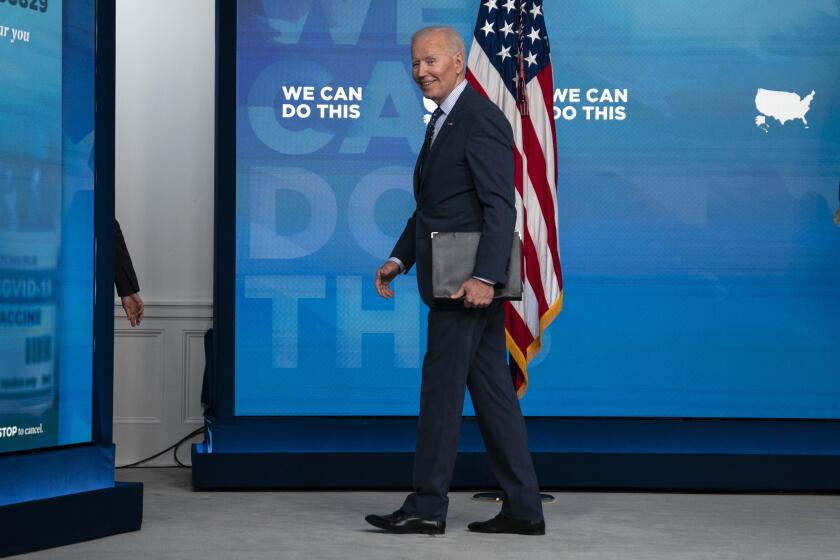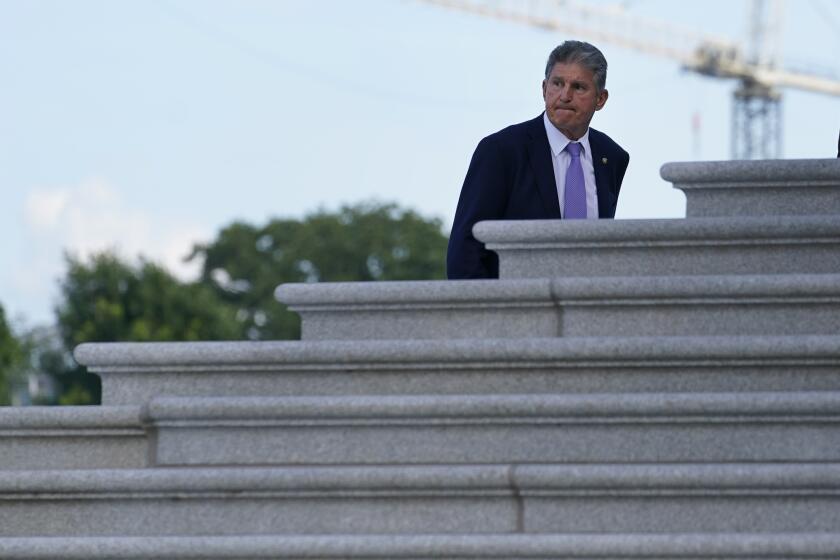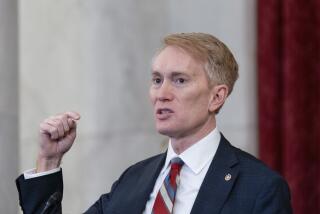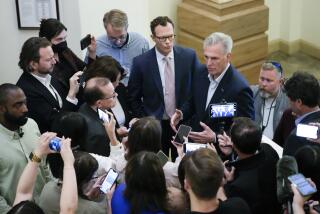Biden ends infrastructure talks with group of GOP senators
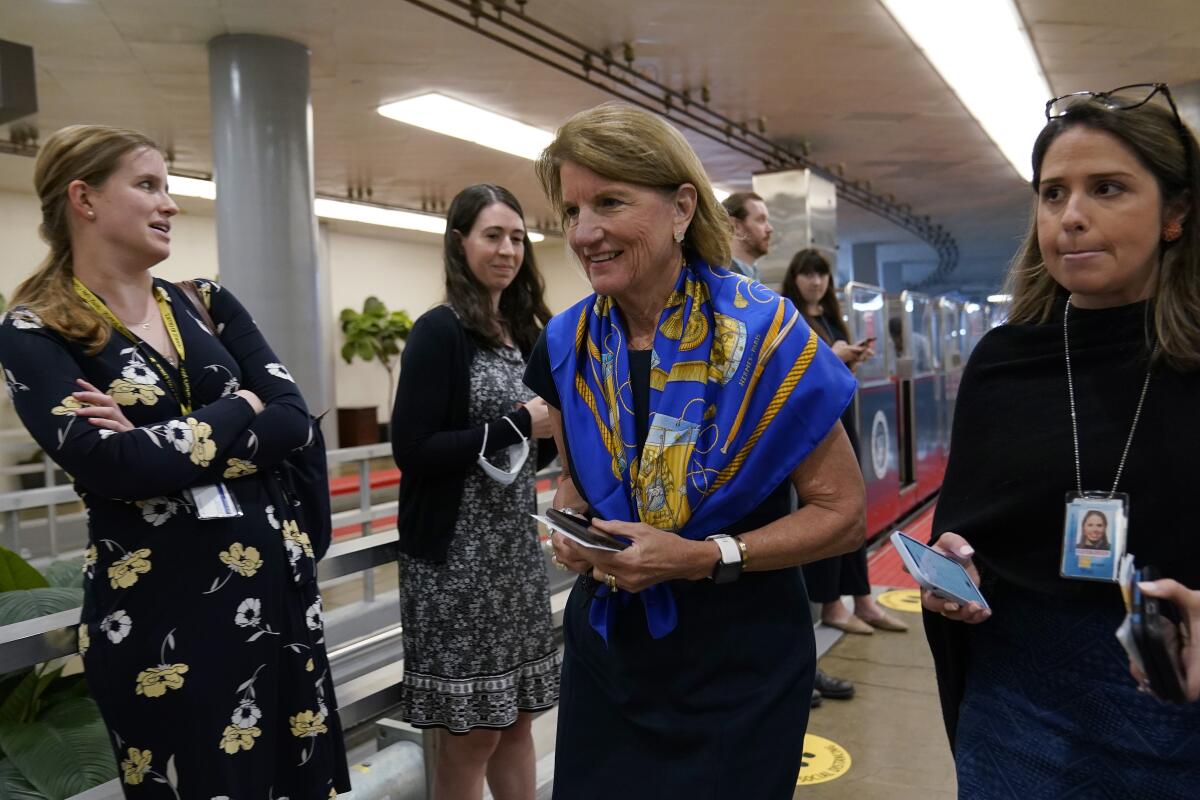
- Share via
WASHINGTON — President Biden ended talks with a group of Republican senators on a big infrastructure package on Tuesday and started reaching out to senators from both parties in a new effort toward bipartisan compromise, setting a summer deadline for Congress to pass his top legislative priority.
The president is walking away from talks with lead Republican negotiator Sen. Shelley Moore Capito after the two spoke Tuesday, but would welcome her in the new bipartisan group, according to an administrative official who spoke on condition of anonymity to discuss the private negotiations.
At the same time, with anxiety running high as time slips by, Democrats are laying the groundwork to pass some or all of the ambitious package on their own. Biden conferred Tuesday with House Speaker Nancy Pelosi and Senate Majority Leader Charles E. Schumer about launching the budget resolution process for Senate votes in July, the White House said.
“The President is committed to moving his economic legislation through Congress this summer, and is pursuing multiple paths to get this done,” White House Press Secretary Jen Psaki said in a statement.
The breakdown comes after weeks of prolonged infrastructure talks between the president and Capito as the two sides failed to broker the divide over the scope of Biden’s sweeping infrastructure investment and how to pay for it.
The Republican senators offered a $928-billion proposal, which included about $330 billion in new spending — but not as much as Biden’s $1.7-trillion investment proposal for rebuilding the nation’s roads, bridges, highways and other infrastructure, including Veterans Affairs hospitals and care centers.
Biden has proposed raising the corporate tax rate from 21% to 28%, a nonstarter for Republicans, and rejected the GOP senators’ suggestion of tapping unspent COVID-19 aid money to fund the new infrastructure spending.
The meeting, at least part of which was not expected to include even senior aides, appeared to be an effort to build more of a personal rapport than to hash out the specifics of a deal.
In a statement, Capito said she was disappointed that Biden ended the talks, but also expressed interest in ongoing bipartisan work.
“While I appreciate President Biden’s willingness to devote so much time and effort to these negotiations, he ultimately chose not to accept the very robust and targeted infrastructure package, and instead, end our discussions,” she said. “However, this does not mean bipartisanship isn’t feasible.”
As Biden aims for a compromise deal, he has begun reaching out to other senators, including Republican Sen. Bill Cassidy of Louisiana and two key centrist Democrats, Joe Manchin III of West Virginia and Sen. Kyrsten Sinema of Arizona, whose votes will be crucial in the evenly split Senate.
Those senators receiving phone calls from Biden are engaged in bipartisan talks, and a bipartisan group with Sen. Mitt Romney (R-Utah) was meeting later Tuesday at the Capitol to negotiate a fresh proposal.
Psaki said the president urged the senators to continue their work “to develop a bipartisan proposal that he hopes will be more responsive to the country’s pressing infrastructure needs.” Biden tapped Cabinet and White House aides to meet with the senators in person.
With the narrowly split House and the 50-50 Senate, the White House faces political challenges pushing its priorities through Congress with Democratic votes alone. Biden’s party holds a slight majority in the Senate because Vice President Kamala Harris can break a tie.
The special budget rules could provide Biden with an alternative path, particularly in the Senate, because they allow legislation to be approved with a 51-vote threshold, rather than the 60 votes typically needed to advance a bill past a filibuster — in this case, led by Republicans against the Biden package.
Six months into the Democrats’ hold on Washington, the party’s progressive wing is growing increasingly restless.
Democrats are watching warily as time passes and anxiety builds over an agreement, with many lawmakers worried they are not fulfilling their campaign promises to voters who put the party in control of Congress and the White House.
During a private discussion among Democratic senators at lunch Tuesday, there were differing views over whether they should keep talking with Republicans or pursue an approach that would allow them to pass a bill on their own, through the budget reconciliation process.
Schumer told reporters afterward that Democrats are pursuing “a two-path approach.”
The bipartisan talks led by Sinema with the other senators are underway, Schumer said, while the budget committee is preparing the legislation that would allow passage through the reconciliation process.
“It may well be that part of the bill that is passed will be bipartisan, and part of it will be in reconciliation,” he said. “But we’re not going to sacrifice bigness and boldness.”
The president is expected to engage with lawmakers while he sets out this week on his first foreign trip for an economic summit of the Group of 7 industrialized nations in Europe.
Ahead of Biden’s announcement, the White House had also spoken to other lawmakers, including from the House.
Rep. Josh Gottheimer (D-N.J.) and Rep. Brian Fitzpatrick (R-Pa.), the co-chairs of the bipartisan Problem Solvers Caucus, spoke late Monday with Brian Deese, director of the White House National Economic Council, about bipartisan efforts to reach an infrastructure deal, according to an aide who spoke on condition of anonymity to discuss the private conversations.
Gottheimer is also working with Cassidy and Sinema from the senators’ group, the aide said.
More to Read
Sign up for Essential California
The most important California stories and recommendations in your inbox every morning.
You may occasionally receive promotional content from the Los Angeles Times.
